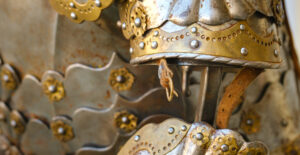
In a small studio behind a scrapyard in Soweto, the smell of solder lingers in the air like a hymn. Gold wires curl on a worn table, coiled beside strips of sheet metal and a stack of old poems written on lined paper. There’s no gallery here. No velvet ropes or spotlights. Just a man with a blowtorch and a verse carved into memory. His name is Mvelo, but he signs his work “Molten.” On his wrist, a cuff etched with words once scrawled on the back of a protest placard, “We rise with the heat, we fall when ignored.” He doesn’t sell jewellery. He sells resistance.
In a country where gold built both cities and graves, it’s no surprise that it still draws power. But what’s shifting, quietly, defiantly, is what people are doing with that power. Forget the bullion bars, the wedding bands, the luxury watches. There’s a new wave of goldsmith-poets, street-wordsmiths, and wearable dissenters turning the country’s most precious metal into portable protest. Their medium glows. Their message burns.
For them, gold is no longer just a symbol of wealth, it’s a surface for memory, grief, defiance. Pendants shaped like burning tires. Earrings inscribed with quotes from disappeared activists. Chains that hold words too dangerous for billboards, too permanent for ink. The poems aren’t recited anymore. They’re worn. Against the chest. Over the heart. Around the neck like a reminder, you’re not silent, even when you’re tired.
One collective based in Makhanda calls themselves The Forge. They work with discarded gold from pawn shops and melted-down trinkets. “We only use pieces that have a story,” says Sine, the collective’s founder. “Gold already has a history in this country. Our job is to add footnotes.” Those footnotes include lines from protest songs, graffiti slogans, banned literature. A popular bracelet they crafted last year bore the phrase “Nkosi sikelel’ iNdlula,” a twist on the anthem that translates roughly to “God bless the queue,” referencing the endless lines for grants, water, and justice.
Their work started appearing in township markets and art pop-ups, but it didn’t stay there. DJs wear their pieces on live sets. Students pass them around in campus protests like sacred tokens. Even city professionals are slipping them under their blazers, under the radar but never out of reach.
There’s something radical in the decision to wear poetry, especially in gold. The irony isn’t lost on anyone, using the very symbol of colonial greed to push back against its legacy. It’s not accidental. It’s surgical. The words etched into these pieces don’t fade. That’s the point. While protest posters get torn down and social media posts buried in algorithms, engraved gold sits there. Quiet. Indestructible. A silent scream with a lifespan far longer than a tweet.
Zanele, a poet from Durban who began engraving after her brother was shot during a housing protest, says it best, “They can forget our names, but they won’t forget our lines if they wear them.” Her current collection includes delicate rings engraved with micro-poems, each just five words long. One reads, “Home is not a shack.” Another, “Your silence is the system.”
This isn’t art for tourists. It’s not trying to be pretty or digestible. It bites. It scratches. It forces a conversation. A student once wore one of Zanele’s pendants, engraved with a quote from the Marikana hearings, to a family lunch and was asked to remove it. “They said it wasn’t appropriate,” she recalls. “Which means it’s doing its job.”
 Even the process of making these pieces carries weight. Every strike of the hammer echoes. Every line engraved is a ritual. The gold isn’t polished to perfection, it’s left slightly rough, slightly real. “Too smooth and it forgets where it came from,” Mvelo explains. “We don’t want people to forget.”
Even the process of making these pieces carries weight. Every strike of the hammer echoes. Every line engraved is a ritual. The gold isn’t polished to perfection, it’s left slightly rough, slightly real. “Too smooth and it forgets where it came from,” Mvelo explains. “We don’t want people to forget.”
Some of the engraved gold finds its way into the hands of foreign collectors, but the artists aren’t interested in global approval. “If a Paris gallery wants a necklace that says ‘Rhodes Fell,’ they can have it,” laughs Sine, “as long as it funds the next batch for local students.”
There’s a strange intimacy in this kind of protest. It’s not shouted from rooftops. It’s whispered through metal, clinking softly in taxi rides and classrooms. It lives in the everyday, on the wrists of mothers, the necks of nurses, the ankles of dancers. It’s political jewellery, yes, but it’s also a kind of spiritual armour. It says, I see what’s happening. I haven’t forgotten. I won’t let you forget either.
The government hasn’t cracked down on the movement, perhaps because it doesn’t know how. It’s hard to regulate what looks like fashion. Hard to censor what’s hiding in plain sight. And maybe that’s the point. This is protest evolved. Protest that fits into pockets and jewelry boxes. Protest that doesn’t march, but moves.
It’s also deeply South African. Gold has always been our burden and our blessing. It built our cities and broke our backs. So to take that same material and use it as a platform for resistance? That’s alchemy of the fiercest kind. Turning trauma into art. Pain into permanence.
In a workshop in Cape Town, a young artist named Teboho is engraving a set of wedding bands. They’re for a couple who met at a student protest and requested a line from the Fees Must Fall movement. He squints as he carves the tiny words, “Knowledge is gold. But so are we.” When he finishes, he holds up the ring to the light. It catches a glint, not from the metal, but from the message. There are no exhibitions planned. No press releases. These pieces travel through word of mouth, hand to hand. They’re not just jewellery. They’re history you can touch.
Because in a country where gold has too often been a symbol of silence or excess, there’s something quietly revolutionary about turning it into testimony. Into protest. Into poetry that doesn’t just speak, but stays.



